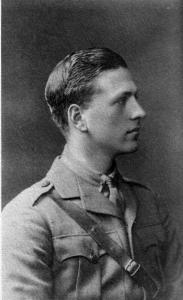
|

|
| Lieutenant Robert William EYTON | |
|
7th Battalion Rifle Brigade (The Prince Consort's Own) attached to the 41st Light Trench Mortar Battery Date of birth: 21st December 1895 Date of death: 22nd March 1918 Killed in action aged 22 Commemorated on the Pozieres Memorial Panel 81 to 84 |

|
| Robert "Bobby" William Eyton was born at Whitton, Leintwardin in Herefordshire on the 21st of December 1895 the son of Lieutenant Colonel Philip Eyton, Border Regiment, and Agnes Isabella (nee Seymour) Eyton of Gwydr House, Overton on Dee, Flintshire in Wales. He was educated at Mill Mead School in Shropshire, at Mr J.A. Lush's School at Hillbrow, Rugby, and at Lancing College where he won a Scholarship and was in Olds House from September 1909, in News House from September 1910 and in Gibbs House from September 1913 until December 1914. He was a Sergeant in the Officer Training Corps, achieving Certificate A, was a Librarian in 1914 and was Captain of Fives the same year. He achieved his Higher School Certificate in July 1914. He was appointed as a House Captain in September 1912, as a Prefect in January 1914 and as Head of House in September 1914. On leaving school he was offered a place at Queens College Oxford but instead he applied for a commission on the 17th of December 1914 in an application which was supported by the Reverend Bowlby, Headmaster of Lancing College. He was commissioned as a 2nd Lieutenant in the 7th Battalion Rifle Brigade on the 9th of January 1915 and embarked for France on the 22nd of July 1915. He joined his battalion in field at Watteau on the 11th of August. In April 1916 he attended a course at the 3rd Army School before transferring to the 41st Light Trench Mortar Battery on the 23rd of April 1916. He joined them in the field on the 21st of April and was promoted to Temporary Lieutenant on the 10th of June 1916. He and was mentioned in Sir Douglas Haig's despatches of the 9th of April 1917 and was promoted to Lieutenant on the 1st of July 1917. At 4.40am on the 21st of March 1918 the bombardment began which marked the opening of the long awaited German spring offensive on the western front. There was dense fog which was supplemented with gas shells making visibility for the British defenders as low as ten yards in places. The 41st Light Trench Mortar Battery was part of 41st Brigade which held the line to the south of St Quentin around the villages of Urvillers and Essigny. At 9am the enemy infantry attack began and contact was soon lost with the front line. It was not until nearly noon when a message reached 14th Division Headquarters that the Germans had broken through the line after years of stalemate. By 5.30pm the 14th Division (of which 41st Brigade was part) held a line from a mile to the north of Hinacourt to the railway cutting due west of Essigny. At 9.15pm orders were given that the Division would withdraw across the Crozat Canal and the withdrawal took place at 11.30pm. By 7am the following morning the Germans had arrived on the eastern bank of the canal and, after making a number of attempts to cross the canal during the early part of the day, they settled for firing enfilade machine gun and artillery fire on the defenders of the western bank. There was little cover for the men of 41st Brigade and casualties were so high that the Brigade almost ceased to exist but held the line throughout the day. Robert Eyton was killed near Flavy-le-Martel during this action. His mother received the following telegram dated the 9th of April 1918: - "Deeply regret Lt. R.W. Eyton General List attached 41 TMB killed in action March twenty second. The Army Council express their sympathy." He is commemorated on the war memorial at Mill Mead School and on the memorial at Overton on Dee, near Wrexham in Wales. |
|
| Gibbs House |
Back